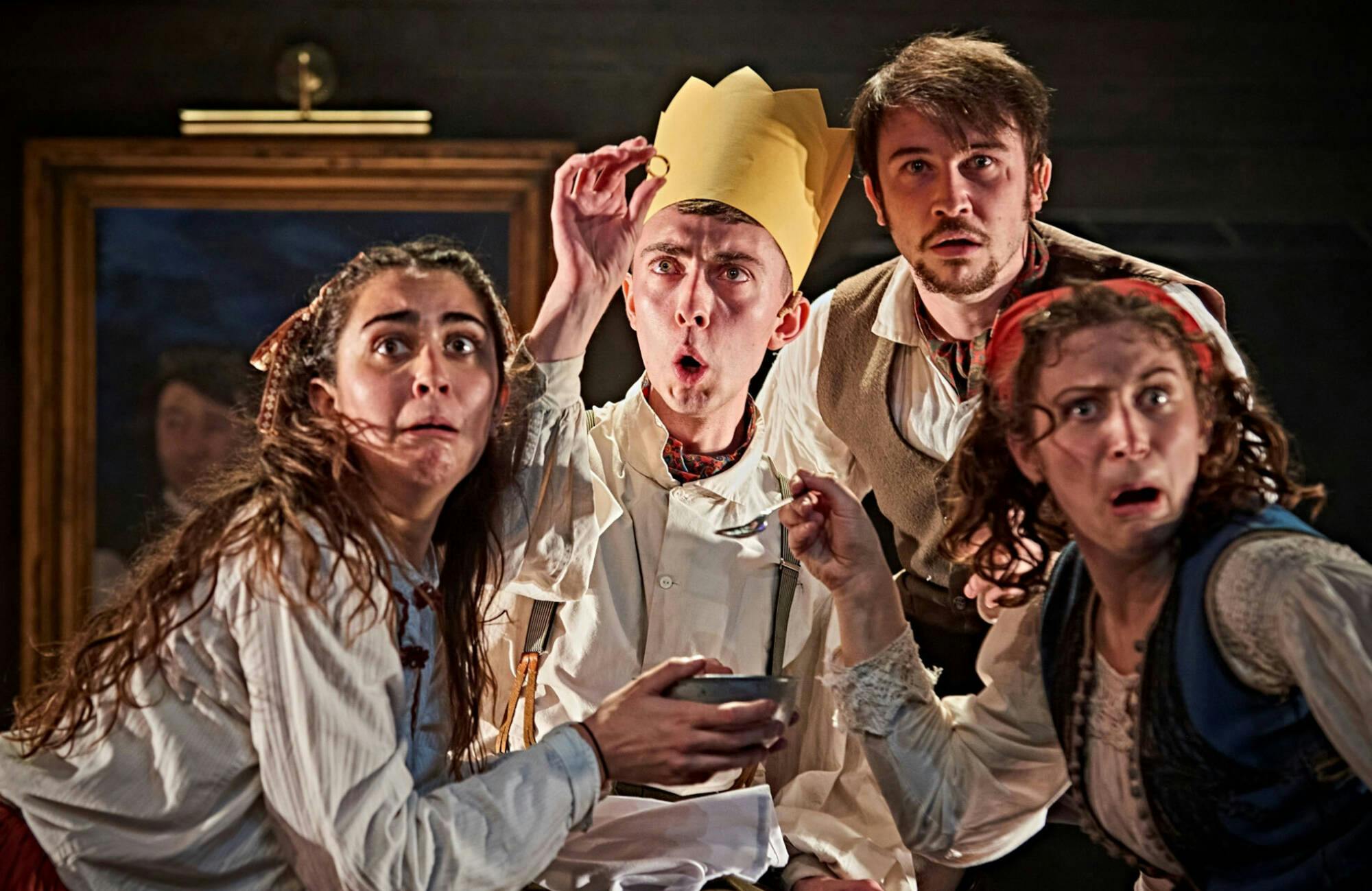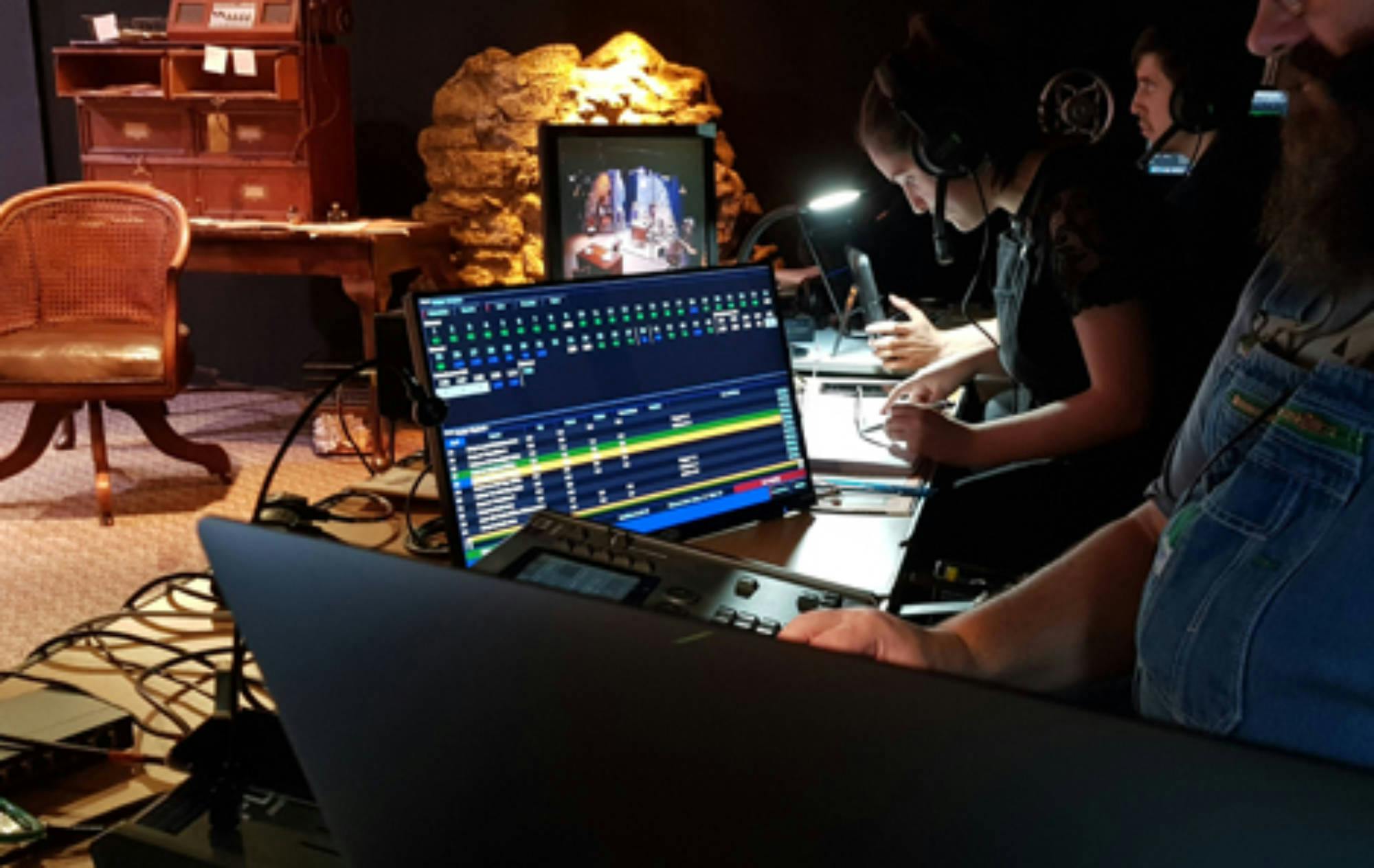
Richard Burton Company: A stage management perspective

This winter’s set of shows brought audiences back to the College to share our performances in person, and some of our Stage Management & Technical Theatre students shared their experiences working on the three productions.
Pre-production – Getting the productions started
Joe Hancock, the stage manager for Philip Pullman’s Grimm Tales in the Bute Theatre, explained how the show’s process begins.
‘It’s called the pre-production stage and that’s where you have the rehearsals going on, with the actors learning their lines and working with the director.
As the Stage Manager I’ll be looking at the budget, managing that, making sure I work closely with the ASMs (Assistant Stage Managers) who’ll be looking at the props, making sure that the director’s happy and that certain health and safety requirements are being met.
A particularly important learning experience for me has been the paperwork and learning how risk assessments work.’
Overseeing the whole production
The stage manager liaises between members of the production team.
‘You start to appreciate people in different departments a lot more,’ said Joe.
‘I have to make sure people are kept in the loop. One of my key roles is looking at the bigger picture and constantly overseeing the production as a whole.'
'In the best way possible, I’ve never been so tired. It’s like having a one-track mind, being so invested in the show.’Joe Hancock
Lighting the way
Matthew Dean, the lighting designer for One Man, Two Guvnors in the Richard Burton Theatre, explained how this was a new challenge for him. ‘My usual lighting style is dark and dingy with bright flashes, but the whole point of comedy lighting is that you get into the eyes and make people’s faces pop.
I took my own style and added that element, but bigger, instead of closed down and small, to create the right effect. My advice is – don’t be afraid to be bold!
Comedy is totally different to what I’ve done before, it’s a big contrast. Something new, which I love.’
Lighting and sound
Emily Foster and James Stevenson, the lighting designer and sound designer for Abigail’s Party in the Caird Studio, are both second years, exploring these specific roles for the first time.
‘I wanted to do lighting design for a while and I was happy to get the opportunity,’ said Emily. ‘It was also my first time working in the Caird. It’s such a unique venue, with a really low ceiling, which makes it hard to light, but I really enjoyed the challenge and I’m really proud of the outcome.’
‘The key part of Abigail’s Party is that you’re not actually at the party. Abigail’s party is actually two doors down from where the play is set,’ explained sound designer James.James Stevenson
‘It was a challenge finding good quality rock music from the time and working with the team to analyse what Abigail would have been listening to.
‘One of the highlights for me was using a really lovely record player with its own speakers, and we were able to play music from those. We had the challenge that the actors actually had to put the needle onto the records. I was quite used to using one, so always kept an eye on how they used it.'
‘With this course we have the chance to try out different roles. It’s great that they teach you different pathways as it allows you to decide early in your career what you want to specialize in.’James Stevenson
Bringing it all together – tech week
Lighting designers Emily and Matthew both explained how their highlights came from ‘tech week,’ where all the elements of the production come together.
‘The first time we ran through the lighting states we’d created was a real highlight,’ said Emily. ‘I really struggled to visualise what I was making and wasn’t sure how it would come across, but when I saw it, it actually looked cool!’
'My favourite part was probably plotting the lighting,’ explained Matthew, ‘You can play around with the ideas you’ve had in your head for ages and watch them come to life. You have a really nice dialogue between yourself, the designer, the director and your programmer.
It always has to be collaborative. I love the collaborative effort and I think that’s what pulls people into this industry.’
Working as professionals
The stage management students start working on show placements from their first year.
‘Right from the start of first year, especially after Christmas, we are basically treated as professionals,’ Emily explained. ‘This is beneficial, as you have to work things out for yourself.'
'It nurtures you, but also makes you have to take on the role of trouble-shooter and problem-solver yourself,’ said Matthew, ‘I think that’s what's really good about what we get here at RWCMD.’Emily Foster and Matthew Dean
‘The supervisors are really great at guiding you on your placement,’ agreed James.
Getting out
As the shows came to a close Joe explained that his role now was organising the ‘get out’: ‘You can only plan so far. When you come into the space it’s a different playing field.
But learning the stage management job is knowing you can only do so much, and not being hard on yourself.
'The whole three years at the College doing the course has been a journey in itself. The stage manager role has been a completely different journey, but both have been incredible.’Joe Hancock









